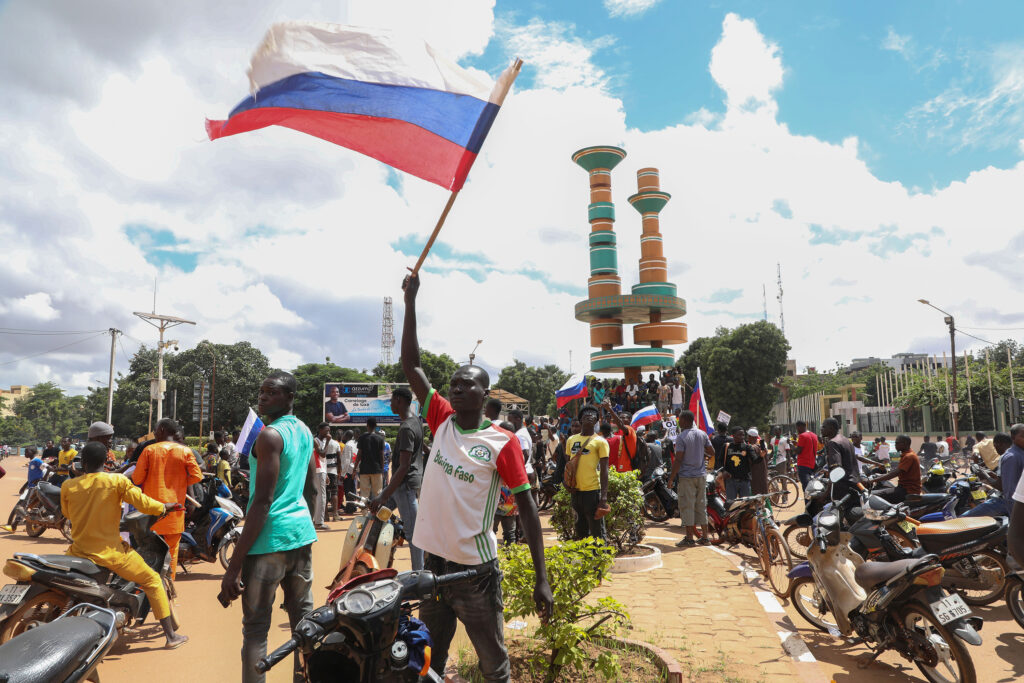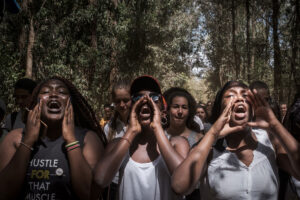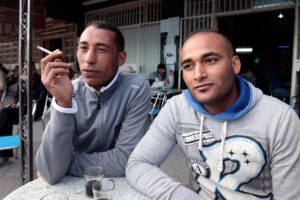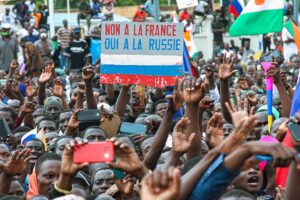Africa’s Populist Trap

In February 2022, just days before Russia invaded Ukraine, Kenya’s ambassador to the United Nations, Martin Kimani, delivered a speech that startled the chamber—and, briefly, the world. “We meet tonight on the brink of a major conflict in Ukraine,” he said. “The diplomacy we urged on the 17th of February is failing. The territorial integrity and sovereignty of Ukraine stands breached. The Charter of the United Nations continues to wilt under the relentless assault of the powerful.”
Calmly, authoritatively, he then connected the breach of sovereignty to the unfinished business of empire: the messy borders, the fractured nations, the postcolonial inheritance that continues to harm Africa’s political landscape. He said: “Kenya and almost every African country was birthed by the ending of empire. Our borders were not of our own drawing. They were drawn in the distant colonial metropoles of London, Paris, and Lisbon, with no regard for the ancient nations that they cleaved apart.”
Kimani’s speech travelled widely. It was quoted in editorials, shared across social media, and discussed on international news platforms. It was striking how Africa, for once, was not being spoken for––it was speaking for itself.
The following year, another powerful African voice intervened on the global stage. The occasion was the 2023 Russia–Africa Summit, and the speaker was Burkina Faso’s leader, Captain Ibrahim Traoré. One line reverberated with force: “For more than eight years we [Burkina Faso] have been confronted with the most barbaric, the most violent form of imperialist neo-colonialism. Slavery continues to impose itself on us.” His address was also met with thunderous applause. On platforms like Instagram and TikTok, excerpts from it circulated widely as a rallying cry for African sovereignty. The speech cemented Traoré’s image as a man of the people, an embodiment of African pride, a revolutionary unburdened by victimhood. “Our predecessors taught us one thing,” he continued, “a slave who cannot assume his own revolt does not deserve to be pitied.”
Both Kimani’s and Traoré’s speeches were anti-imperialist, both were delivered by African leaders on the global stage, both called out the colonial legacies shaping contemporary politics. Yet a key difference stands out between them: one was decolonial in orientation, while the other, I argue, embodied the rhetoric of what I refer to as PAWN: Populist Anti-Western Nativism. This form of rhetoric presents itself as anti-imperialist but ultimately feeds on repressive ideology. The differences between decolonization and PAWN urgently need to be recognized because ultimately true decolonization cannot be reached through populism and nativism.
Populism is often conflated with a particular Western pathology: Brexit slogans, white men in red baseball caps, and “anti-woke” YouTube channels. But it is a global phenomenon, manifesting in various forms across continents. Africa is no exception. In fact, the hallmarks of populism are what make it so alluring to many Africans.
Populism centers on people’s cultural, economic and political wounds, and promises to heal them. In Africa, those deep wounds are sustained by cyclical systems of domination: colonization, extraction, racism, and occupation. As one oppressive system recedes, another takes its place. The transatlantic slave trade gave way to colonialism. Colonialism morphed into Cold War proxy rule, which in turn evolved into neoliberalism and extractivism. If Africa were a body, it would be covered in a thousand cuts, each one pleading for care.
Populism offers a balm. It promises to proactively address the wounds. It identifies the enemy and commits to a mass mobilization against them. It honors victims’ pain and offers moral virtue as recompense. Its political strength is the ability to fold complex political questions into a simple moral binary: us versus them. In the African context, “us” refers to native Africans; “them” is the West.
Of course, the West’s meddling in Africa has earned condemnation a thousand times over. PAWN is structured around legitimate wounds—grief, shame, anger, fear, injustice. This emotional acknowledgement is what gives PAWN its populist appeal. The remedial formula it proposes—the West as the wound, Africa as the balm—is what makes it anti-Western and nativist. PAWN turns geography into a moral location. Virtue becomes a matter of origin rather than action. To be African is to be right because the West has been wrong.
But can a culture progress if it doesn’t look at itself with rigor? Can a culture develop itself critically if the focus is always on an external actor, however egregious that actor might be?
There’s a line I keep thinking about from Nietzsche, in On the Genealogy of Morality: “The slave revolt in morality begins when ressentiment itself becomes creative and gives birth to values: the ressentiment of beings who, denied the proper response of action, compensate for it only with an imaginary vengeance.” Nietzsche’s slaves are not literal. They’re metaphors for those whose agency has been suppressed and who now derive a sense of power from vengeance rather than from freedom.
Ressentiment is therefore not mere resentment. It has deeper, more corrosive psychological elements. It is resentment that has been transfigured from a feeling into a moral code and a theory of justice. In this framework, the injury becomes proof—not just that harm was done, but that the harmed are now beyond reproach. It says: because I have suffered, I cannot be wrong. And because I cannot be wrong, the difference between myself and the other is not only sociopolitical but existential.
In referring to Nietzsche, I don’t mean to redeem his horrific gender, race and class politics. (As the feminist philosopher Luce Irigaray wrote in her critical love letter to Nietzsche, Marine Lover, ressentiment can be turned on the man himself: “That the other has given you what escapes your creation is the source of your highest ressentiment.”) Still, Nietzsche’s preoccupations with the effects of uneven power relationships in the human psyche help point us toward the real issue, namely, how to acknowledge colonial harm without falling into the tempting but pernicious clarities of PAWN; how to decolonize without falling for the reductive traps of populism and nativism.
To oppose PAWN is not to dismiss African anger or to deny the legitimate desire for repair. When the world has humiliated you, stripped your ancestors of voice, land, and language, it is tempting and utterly human to want to define yourself by what you are not: not Western, not a colonizer, not “them”. The emotional appeal of PAWN is easy to understand. Yet PAWN doesn’t just divide the world into heroes and villains, it disables the public’s ability to think in anything other than simplistic binaries.
PAWN has no ideological foundation of its own. Its only stance is adopting opposites to values traditionally associated with the West. If the West is ‘pro’ homosexuality, trans-identity, animal rights, democracy, individualism, and, of course, feminism, then PAWN dictates that Africa must be against these things. I introduced PAWN in my recent book, Can Feminism Be African? A Most Paradoxical Question, precisely to examine the contours of the backlash against feminism in Africa. In the backlash discourse, feminism is framed as a tool of Western liberalism, and so the idea that an African woman might embrace feminism for the sake of autonomy over her body, or because Africa has a solid feminist movement of its own, is met with claims that feminism is un-African. In this framework, the African woman is revered, sure – but only if she remains sacrificial and symbolic, never aligning herself with the one movement that has concertedly fought for her rights. PAWN narrows Africanness to a limited set of ethics, attitudes, and beliefs. It offers no real definition of what it means to be African. It is a rejection, not a creation. Conversely, at the kernel of decolonization lies vision.
Traoré became the leader of Burkina Faso in a 2020 coup d’état overthrowing then President Roch Marc Christian Kaboré whom he (rightly) accused of failing to deal with the insecurity and jihadist violence that had the nation in its grip for years. The overthrow marked a broader regional pattern of military takeovers in West Africa. Between 2020 and 2023, a wave of military coups reshaped the political landscape not only in Burkina Faso but also in Mali and Niger. The new leaders—Captain Ibrahim Traoré (Burkina Faso), Colonel Assimi Goïta (Mali), and General Abdourahmane Tchiani (Niger)—all took over in response to the growing disillusionment with democratic institutions that were both ineffective and complicit in neo-colonial governance structures.
In 2024 the three countries withdrew from the Economic Community of West African States (ECOWAS) when the organization applied questionable sanctions to Niger, and instead formed the Alliance of Sahel States (AES), a new regional bloc focused on mutual defense. They immediately expelled French troops. They dropped French as an official language. They nationalized foreign-owned mines. They ditched security arrangements with the US in favor of closer ties with Russia.
It’s easy to see the general appeal of these moves. ECOWAS has indeed become a bastion of elite leadership—aged patriarchs often reluctant to challenge exploitative Western influence, prone to protecting their own interests. Furthermore, the act of reclaiming natural resources—gold, uranium, and others—from foreign corporations and declaring them public property carries both symbolic and economic weight. The rejection of colonial languages and the expulsion of foreign troops undeniably are acts of sovereignty and freedom.
Traoré, the most celebrated of the three AES leaders, is often likened to Thomas Sankara, the much-revered Burkinabè revolutionary assassinated in 1987. He is roughly the same age Sankara was when he seized power through a military coup; he too is articulate, handsome, and charismatic. They both appear to care deeply about their country.
But the comparison doesn’t hold. Sankara was fiercely critical of all forms of imperialism—including Soviet influence—and he positioned Burkina Faso firmly outside the binaries of the Cold War. Traoré, on the other hand, maintains a cozy relationship with Moscow. His flag-waving for Russia and his “bromance” with Vladimir Putin are not subtle. At the Russia-Africa summit, he declared: “Russia is a family for Africa too. We are a family because we have the same history.” Hardly.
PAWN is not only a West African phenomenon. There are others such as South African populist leader Julius Malema and his Economic Freedom Fighters (EFF) party, who have also embraced PAWN, using anti-Western and nationalist rhetoric to rally support, while undermining democratic processes and the ultimate aims of decolonization for an Africa free from imperialism.
Nor does PAWN only show up in the halls of power. It’s visible in the cultural arena too. In Mali, a group of online influencers known as “video men” play a crucial role in shaping political narratives. They champion movements such as Yèrèwolo, blending anti-French sentiment with a pro-Russian agenda. However, the language they employ is not that of geopolitics, but rather the language of pride, resistance, and authenticity. This makes it deeply persuasive. What initially appears as cultural celebration often serves as a direct manifestation of PAWN.
And neither is PAWN new. The emotional and political groundwork for it has been with us for decades. In 1955, at the Bandung Conference, where newly decolonized nations gathered to chart a shared future, the Black American writer Richard Wright observed: “What had these nations in common? It seemed to me nothing, but what their past relationship to the Western world had made them feel.” A year later, James Baldwin reported from another pivotal gathering, the First International Conference of Negro-African Writers and Artists in Paris. “People whose distrust of the West,” he wrote, “however richly justified, also tends to make them dangerously blind and hasty.”
Dangerously blind and hasty, the triumvirate of AES leaders follow the populist playbook seen around the world. Traoré is the most charismatic and best known, but they all employ PAWN, presenting themselves as both insurgents against neocolonialism and the vox populi of their nations. But beyond the catchy soundbites, the deeper questions remain. What are these countries breaking toward? What kind of repair are they calling for? Autonomy for whom? Whose sovereignty?
Certainly not the queer communities now criminalized in Traoré’s Burkina Faso. Not the journalists like Guezouma Sanogo and Boukari Ouoba, arrested for reporting on state repression. Not the opposition parties that are now banned. Under the guise of decolonization, PAWN politicians increasingly target minority groups, including queer communities, activists, and journalists. It seems that whatever positive developments are happening (and there are), they leave little room for dissenting identities and pluralist futures. As scholars like Rahmane Idrissa and Zikore Ibeh have asked: are these actions truly a path to the kind of decolonial liberation people envision?
These questions are not abstract for me. I grew up in 1980s Nigeria under the military rule of General Ibrahim Babangida, who seized power in a coup in 1983. Babangida presented himself as a man of the people, attending soldiers’ children’s birthday parties, making speeches about unity, building infrastructure like roads, dams, and electricity plants, and voicing solidarity with the anti-apartheid struggle. But beneath the surface, Babangida’s regime was marked by deep corruption and repression. Billions were embezzled while dissent was crushed. Living under such a government does something to the psyche—individually and nationally. It doesn’t foster liberation, it builds anxiety. It teaches you that the leader who promises to fight for the people can just as easily become the one who turns against them. It teaches you, above all, to be cautious—and to never celebrate revolution before it earns its name.
PAWN is effective precisely because it mimics the language of decolonization. It sounds like freedom. The people should have a voice. They should resist injustice. They should challenge Western domination. Many hear the messages of PAWN and think this must be what liberation looks like. But listen closely, and you’ll notice that what’s being planted isn’t freedom at all. It is nativism. It’s conservatism. It’s authoritarianism that speaks the language of anti-authoritarianism. It’s dogma speaking the language of liberation. And dogma, even when dressed in the language of resistance, always ends in confinement. PAWN gives us an enemy and then calls that gift freedom.
Freedom—that most sought-after notion—is found in true independence, self-awareness, autonomy, integrity, and the ability to hold hard memories without becoming hardened. The Islamic mystic Rumi said it best: “The wound is the place where the light enters you.” PAWN offers none of these. Populism doesn’t seek to heal wounds. It feeds on them. It aggravates pain into rancour, rancour into ideology, and ideology into power.
The challenge is that it has become increasingly difficult to distinguish between decolonization and PAWN. Bolstered by the continuation of colonialist attitudes in the West’s dealings with the continent, PAWN’s anti-Western rhetoric remains justified. It is a narrative that resonates with those Africans who yearn for decolonization, which, of course, includes most Africans. Yet to have any chance at true decolonization, we must learn precisely to distinguish between the two.
This is why I started with contrasting Kimani’s and Traoré’s speeches. On the surface, both are ostensibly decolonial. They share similarities—language, tone, and even some emotional resonance—but on a deeper level, they are fundamentally different. One seeks liberation through critical thought, dialogue, and complexity, while the other simplifies an entire continent’s struggles into a battle of us versus them. Both are historically grounded and morally charged, but Kimani doesn’t reduce history to a revenge plot. Instead, his UN speech gestured toward a shared human dilemma: how to speak about peace from within a world built on violence. Kimani invoked decolonization not as a weapon, but as a vision. He acknowledged colonial harm without collapsing into ressentiment.
As Nietzsche argued, rather than offer the desired vengeance, ressentiment leads to a denial of life. It turns creative energy into submission to moral condemnation. Instead of progress and fairness, it fosters a reactive and vindictive disposition. “The last sphere to be conquered by the spirit of justice,” he said, “is the sphere of reactive feelings!” Rather than a moral position that centers the powerful and idealizes suffering, he called for the creation of new values by individuals who live in vitality with their will to power.
There are many visions that could serve Africa and its people better than PAWN. In Achille Mbembe’s Critique of Black Reason, the Cameroonian thinker maintains that we shouldn’t see Africa as a static emblem of cultural purity, “a community of loss”, as if its only power lies in what has been preserved, rather than what can be created. For Mbembe, racism calls ressentiment into being, yet “a world freed from the burden of race, from resentment, and from the desire for vengeance” is, accordingly, the realization of a “common consciousness of the world, which is the basis for the fulfilment of universal justice.”
In South Africa, land reform movements seem to be responding to Mbembe’s vision pushing for a “decolonization of the commons” that acknowledges not only historical injustices but also the importance of inclusivity and collective progress in future society. The African feminist movement, LGBTQIA+ advocacy, and environmental justice groups across the continent also show that a simple rejection of the West and a glorification of Africa can be expansive. They show that African liberation can be reframed beyond the narrow boundaries of PAWN. These movements do not romanticise African identity. They interrogate it. And in doing so, they demand a future not defined by vengeance, but by vision. They show that if ressentiment is central to PAWN, its undoing must also be essential to any politics that dares to call itself decolonial.
Minna Salami is a senior fellow and program chair at The New Institute and a public speaker. Her most recent book is Can Feminism Be African? A Most Paradoxical Question published by Harper Collins.


